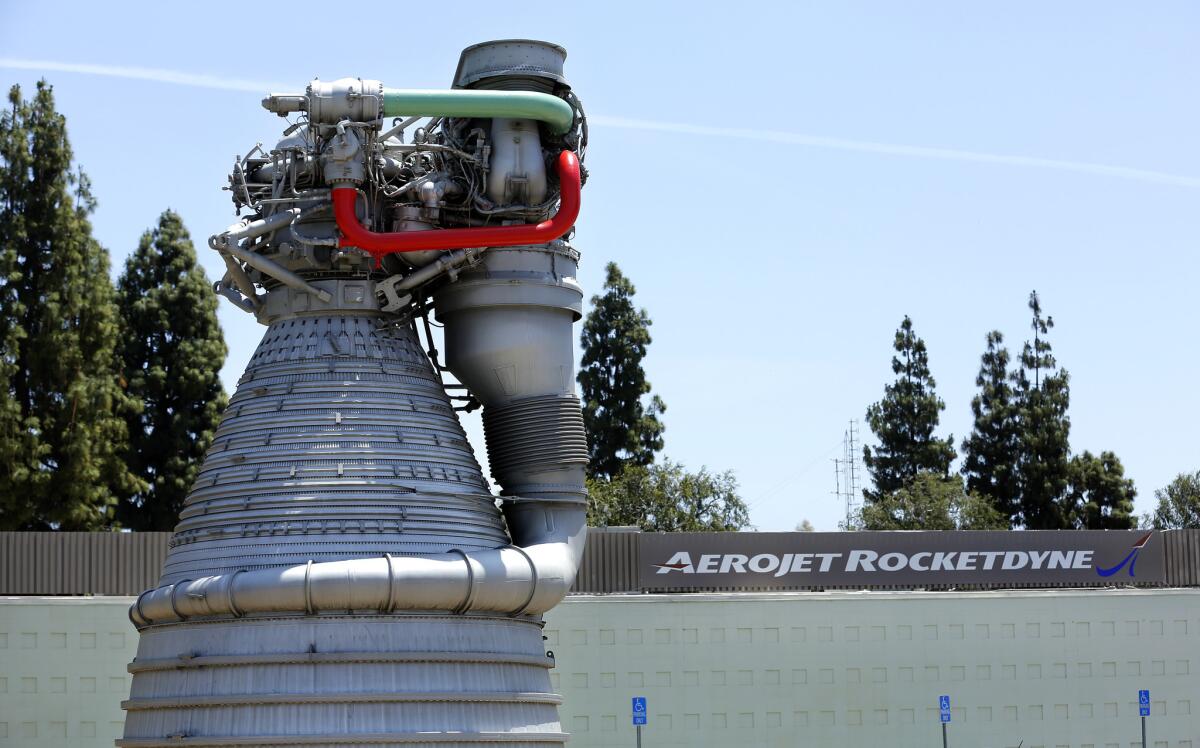Aerojet Rocketdyne and ULA win Air Force funds to replace Russian engine

A model of the F-1 gas-generator cycle rocket engine used in the Saturn V rocket in the 1960s and early ‘70s can be seen near the entrance to the Aerojet Rocketdyne facility in Canoga Park.
- Share via
Rocket engine manufacturer Aerojet Rocketdyne and United Launch Alliance will join forces with the Air Force to develop an American-made rocket propulsion system to replace the Russian engine currently being used to blast many government satellites into orbit.
The public-private partnership, announced Monday, will fund development of Aerojet’s AR1 engine. The liquid oxygen and kerosene-fueled booster engine is slated for completion in 2019.
Under the agreement, the Air Force will invest two-thirds of the money needed to complete development by 2019. Initially, the Air Force will contribute $115.3 million, and Aerojet and ULA will fund $57.7 million.
Aerojet is based in Sacramento and has a facility in Canoga Park. ULA is a joint venture of Boeing Co. and Lockheed Martin Corp. based in Centennial, Colo.
Read the latest Essential California newsletter >>
The total potential investment from the government is $536 million. Aerojet and its partners’ total potential investment is $268 million, for a total agreement value of $804 million.
Aerojet Chief Executive Eileen Drake said in a statement that the company was drawing on its “rich knowledge of rocket engines,” along with new advances in modern manufacturing to make a “state-of-the-art engine that will end our reliance on a foreign supplier to launch our nation’s national security assets.”
Aerojet’s AR1 engine is intended to replace the Russian-built RD-180, which powers ULA’s Atlas V rocket. Aerojet said the AR1 engine can also be used for ULA’s Vulcan rocket, which will launch in 2019 with an American engine, and other launch vehicles currently being used.
“ULA is fully committed to transitioning as quickly and affordably as possible to a domestic engine,” ULA Chief Executive Tory Bruno said in a statement.
On Monday, ULA and the private space company owned by Amazon.com founder Jeff Bezos also announced a public-private partnership with the Air Force to develop an American engine for ULA’s Vulcan rocket.
Development of the BE-4, which is a liquid oxygen and liquid natural gas rocket engine, has been fully funded by Bezos’ Blue Origin, with investment from ULA, the companies said in a statement.
The agreement with the Air Force also includes funding for ULA’s Advanced Cryogenic Evolved Stage rocket propulsion system, which is an upper-stage engine for the Vulcan rocket.
A majority of the funding amount is intended for the BE-4’s development.
Initial funding from the Air Force will total $26.3 million, with ULA contributing $40.8 million. The total potential investment for the government is $201.7 million, and the total potential investment for ULA is $134.2 million.
ULA’s partnership with Blue Origin is separate from the one it has with Aerojet.
“ULA continues to work with both Blue Origin and Aerojet Rocketdyne to pursue two options for a next-generation American engine and that is why we’re teaming with two of the world’s leading propulsion companies,” Bruno said in a statement.
For more business news, follow @smasunaga on Twitter.
ALSO
Pentagon wages cyberwar against Islamic State
SpaceX scrubs rocket launch just moments before liftoff
Rubicon Project earnings and Snapchat ad moves are among the week’s L.A. tech highlights
More to Read
Inside the business of entertainment
The Wide Shot brings you news, analysis and insights on everything from streaming wars to production — and what it all means for the future.
You may occasionally receive promotional content from the Los Angeles Times.











